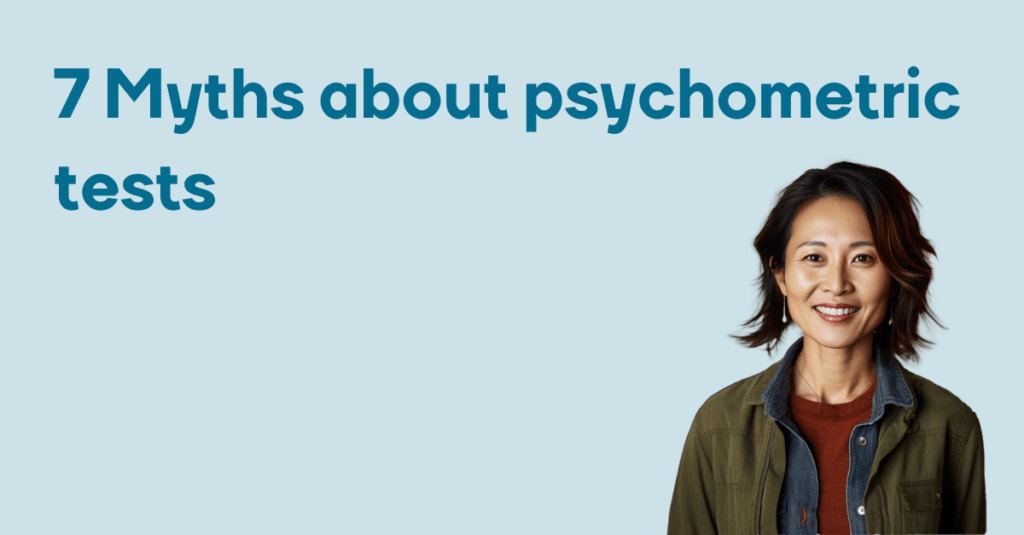Misconceptions around psychometric assessments have been persistent, and they often create unnecessary doubt in the minds of recruiters and candidates alike. Let’s debunk some of these myths and provide clarity.

1) Candidates can manipulate the results
This myth comes up frequently. Many believe candidates can manipulate the results to present a false or overly favourable image.
However, modern assessments, like those from Clevry, use a range of built-in checks (e.g., impression management scales, test score verification, randomised item banks, and clear candidate instructions). These techniques discourage dishonesty and help provide a fuller picture of a candidate’s true workplace motivations, strengths, and capabilities.
2) Psychometrics can’t outperform my gut instinct
Human decision-making is inherently influenced by unconscious biases, no matter how skilled or experienced the interviewer. There are several types of biases at play:
- Confirmation Bias: We tend to seek out information that confirms our early impressions of a person.
- In-group/Out-group Bias: We often feel more comfortable with people who resemble us or belong to a group we identify with.
- Halo Effect: We may overemphasise one positive trait and assume the person excels in other areas as well.
Objective psychometric assessments help counter these biases by providing reliable, data-driven insights, meaning you can make better informed hiring decisions – without having to rely on gut instinct alone.
3) Assessments will deter candidates
Contrary to popular belief, candidates appreciate fairness in recruitment processes. Research shows that a fair and transparent system, aided by psychometric assessments, can enhance the overall candidate experience.
Recruiters can gain candidate trust by explaining how the assessments relate to the job and the reasons behind using them. This approach not only engages candidates but also offers them a modern, well-structured recruitment process.
4) Psychometric assessments don’t yield clear ROI
Seeing clear returns on investment is essential, and psychometric assessments can deliver both direct and indirect financial benefits. By optimising hiring processes, recruiters can save both time and resources. Here are some tangible results clients have had using the Clevry platform, including:
- A 50% reduction in the need for expensive assessment centres.
- Lowering attrition rates from 43% to just 9%.
- Doubling the number of successful candidates progressing to second-round interviews.
- Reducing recruitment time by 84%.
- Cutting administrative workload by 60%, saving up to £30,000 annually.
- Achieving a 30% improvement in successful hires.
As businesses become more digitally aware, demonstrating these returns will become increasingly crucial.
5) Psychometric tests don’t work
Psychometric assessments are rigorously developed and validated to meet industry standards, such as those set by the British Psychological Society (BPS). These tools must accurately predict job performance, ensuring they assess the qualities and skills they claim to measure.
When combined with structured interviews, psychometric tests offer one of the most reliable, efficient, and cost-effective methods of evaluating a candidate’s potential for success in a given role.
6) Psychometric assessments will replace recruiters
This fear is unfounded. Psychometric assessments are designed to complement a recruiter’s role, not replace it. These tools provide objective data, but ultimately, it is up to recruiters to interpret the results and make informed decisions.
These assessments enhance the decision-making process by providing a deeper understanding of candidates, allowing recruiters to make better, more informed hiring choices.
7) Psychometric assessments are only for high-level positions
A common misconception is that psychometric assessments are only valuable for senior or executive roles. In reality, these tools can be used across all levels of an organisation. Whether it’s for entry-level positions or specialised roles, psychometric tests provide valuable insights into a candidate’s fit for the team and company culture, making them versatile tools in recruitment.
Still got doubts? We’re here to help
If you still have questions or are not completely convinced, feel free to reach out to our team. We’re more than happy to discuss any remaining concerns or myths about psychometric testing you might have, or show you a quick demo of the platform in action.



